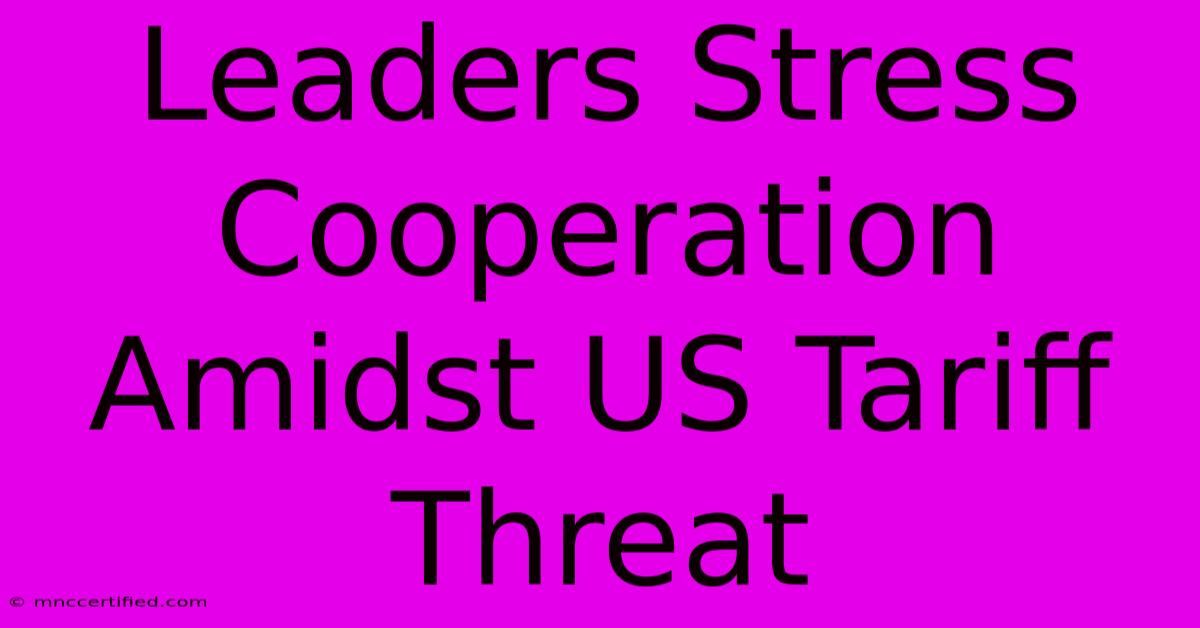Leaders Stress Cooperation Amidst US Tariff Threat

Table of Contents
Leaders Stress Cooperation Amidst US Tariff Threat
The looming threat of US tariffs has sent ripples of concern throughout the global economy, prompting leaders to emphasize the crucial need for international cooperation. This isn't just about trade; it's about maintaining stability and fostering growth in an increasingly interconnected world. The potential impact of escalating trade wars is far-reaching, affecting businesses, consumers, and global supply chains.
The US Tariff Threat: A Looming Shadow
The imposition or even the threat of US tariffs has become a significant factor influencing global trade dynamics. These tariffs, often levied on specific goods from particular countries, aim to protect domestic industries. However, the consequences extend far beyond the targeted sectors. Retaliatory tariffs, implemented by other nations in response to US actions, create a cycle of escalating trade tensions. This "trade war" scenario significantly disrupts established trade relationships and introduces uncertainty into the global marketplace. The uncertainty alone can stifle investment and hinder economic growth.
Impact on Businesses and Consumers
Businesses face the immediate challenge of increased costs associated with tariffs. These costs are often passed on to consumers through higher prices, reducing purchasing power and potentially slowing consumer spending. Furthermore, businesses reliant on global supply chains face significant disruptions, leading to production delays and potential shortages. This uncertainty makes it difficult for businesses to plan for the future and invest in expansion or innovation. The knock-on effects can be devastating, impacting employment and overall economic health.
The Call for Cooperation: A Necessary Response
In the face of this escalating threat, global leaders are increasingly stressing the importance of cooperation. International collaboration is presented as the most effective way to navigate these challenges and mitigate the negative consequences of trade disputes. This cooperation manifests in several ways:
Diplomatic Negotiations and Trade Agreements
Negotiations between countries are crucial to finding mutually acceptable solutions. This involves revisiting existing trade agreements and exploring new avenues for cooperation. Renegotiating trade deals allows for adjustments that address concerns while minimizing disruption. The emphasis here is on finding common ground and establishing clear rules of engagement to avoid future conflicts.
Strengthening International Organizations
International organizations, like the World Trade Organization (WTO), play a vital role in facilitating dialogue and resolving trade disputes. Strengthening the WTO and similar institutions is essential to providing a neutral platform for negotiation and dispute resolution. This involves reforming existing mechanisms and enhancing their effectiveness in addressing the complexities of modern trade.
Fostering Dialogue and Understanding
Beyond formal agreements, the emphasis on dialogue and understanding is critical. Open communication between countries is essential to building trust and finding common ground. This requires a willingness to address concerns, listen to different perspectives, and prioritize finding mutually beneficial solutions. Building stronger diplomatic ties is crucial in creating a climate conducive to cooperation.
The Road Ahead: Navigating Uncertainty
The future of global trade remains uncertain, but the emphasis on cooperation offers a path towards a more stable and prosperous future. The challenges are significant, requiring a concerted effort from all stakeholders. By prioritizing dialogue, strengthening international institutions, and finding mutually beneficial solutions, the world can navigate the complexities of the US tariff threat and foster a more resilient and interconnected global economy. Investing in diplomatic solutions is not merely a reactive measure; it’s a proactive strategy for securing long-term economic stability. Ignoring this crucial aspect could have far-reaching and devastating consequences.
Keywords: US tariffs, trade war, global trade, international cooperation, diplomatic negotiations, trade agreements, WTO, economic stability, supply chains, consumer spending, business impact, retaliatory tariffs, global economy.

Thank you for visiting our website wich cover about Leaders Stress Cooperation Amidst US Tariff Threat. We hope the information provided has been useful to you. Feel free to contact us if you have any questions or need further assistance. See you next time and dont miss to bookmark.
Featured Posts
-
Fr44 Insurance Without Vehicle
Nov 27, 2024
-
Home Insurance Fort Collins Co
Nov 27, 2024
-
Sheffield United Defeats Oxford
Nov 27, 2024
-
Travel Insurance For Peruvians
Nov 27, 2024
-
Insurance And Asset Management
Nov 27, 2024